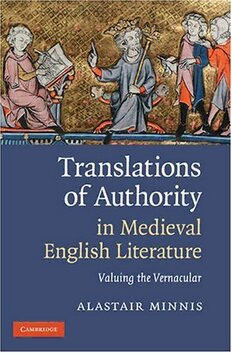
Translations of authority in medieval English literature: valuing the vernacular PDF
290 Pages·2009·1.854 MB·English
Most books are stored in the elastic cloud where traffic is expensive. For this reason, we have a limit on daily download.
Preview Translations of authority in medieval English literature: valuing the vernacular
Description:
Vulgo – ablativus ponitur adverbialiter – .i. ubique partout .i. quemunement,publiquement vel per vulgum .i. inordinate, incondite, vulgariter.Vulgaris et hoc .gare – .i. popularis, publicus, communis, manifestus.i. publiques, quemuns. Vulgariter – adverbium – populairement,publiquement. Vulgaritas .tatis – .i. popularitas, communitas vel publicatio,manifestatio . . . Vulgo .gas .gatum – .i. publicare, manifestare.i. publier, manifester. Vulgatus .a .um – .i. publicatus, manifestatus.These definitions of terms relating to ‘vulgarity’ and the ‘vulgar’ are takenfrom the learned Latin–French dictionary which Firmin Le Ver compiled atthe Carthusian house of St Honor´e at Thuison, near Abbeville, in the firsthalf of the fifteenth century. Public, popular, common, manifest . . . suchare the concepts deemed crucial here. Publicus should be understood asappertaining to people in general (ad omnes generaliter), while popularishas the sense of ‘belonging to or fit for the common people’, ‘availableto, directed towards the whole community, public’. Publicatio has thepre-print culture sense of the transmission of information into ‘a publicsphere of discussion, debate, news, gossip, and rumour, in which thingswere generally spoken of and generally known’. The various ways inwhich these ideaswere negotiated in different medieval European languages(in official, learned Latin and in demotic ‘vulgars’ or vernaculars) and inboth ‘high’ and ‘low’ cultural situations, are the subject of this book. That isto say, ‘vernacular’ will be deployed in its fullest, richest sense, to encompassacts of cultural transmission and negotiation (in which translation fromone language to another may play a major part, but not inevitably). Bysuch a procedure I hope to access some of the ways in which authority was‘translated’, appropriated, disposed, exploited, and indeed challenged byMiddle English literature. Each of the following chapters is an essay in thepolitics of translatio auctoritatis.
See more
The list of books you might like
Most books are stored in the elastic cloud where traffic is expensive. For this reason, we have a limit on daily download.
